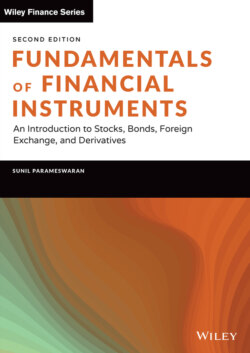Читать книгу Fundamentals of Financial Instruments - Sunil K. Parameswaran - Страница 27
На сайте Литреса книга снята с продажи.
MONEY IS PERFECTLY LIQUID
ОглавлениеWhat is a liquid asset? An asset is defined to be liquid if it can be quickly converted into cash with little or no loss of value. Why is liquidity important? In the absence of liquidity, market participants will be unable to transact quickly at prices that are close to the true or fair value of the asset. Buyers and sellers will need to expend considerable time and effort to identify each other, and very often will have to induce a transaction by offering a large premium or discount. If a market is highly liquid at a point in time, it means that plenty of buyers and sellers are available. In an illiquid or thin market, a large purchase or sale transaction is likely to have a major impact on prices. A large purchase transaction will send prices shooting up, whereas a large sale transaction will depress prices substantially. Liquid markets therefore have a lot of depth, as characterized by relatively minimal impact on prices. Liquid assets are characterized by three attributes:
Price stability
Ready marketability
Reversibility
In these respects, money is obviously the most liquid of all assets because it need not be converted into another form to exploit its purchasing power.
However, liquid assets come with an attached price tag. The more liquid the asset in which an investment is made, the lower the interest rate or rate of return from it. Thus, there is a cost attached to liquidity in the form of the interest forgone due to the inability to invest in an asset paying a higher rate of return. Such interest that is forgone is lost forever, and consequently cash is the most perishable of all economic assets.
Consider a financial surplus of $100,000 that is available with an individual. The most liquid way to keep it would be in the form of cash, but there will be a nil return. If the person were to park the surplus funds in a savings account, he would have to sacrifice by way of liquidity, but would get a return. If he were to move the funds to a time deposit, he would lose even more liquidity, but would earn a greater return as compared to a savings account.
